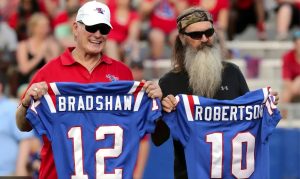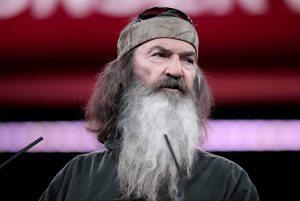Long before he became the grizzled, God-fearing face of Duck Dynasty, Phil Robertson was leading huddles, not hunting parties. In the late 1960s, he wasn’t yet a backwoods philosopher or duck call pioneer — he was a rising star on the football field at Louisiana Tech University, playing the most high-pressure position of all: quarterback.
And he wasn’t just a quarterback. He was the starting quarterback. Strong-armed, agile, and commanding, Phil had the poise to lead a team and the raw talent that turned the heads of NFL scouts. But perhaps the most jaw-dropping part of this forgotten chapter is who sat behind him on the depth chart, waiting for his chance:
Terry Bradshaw — the man who would go on to win four Super Bowls, become a Pro Football Hall of Famer, and eventually one of the most beloved sports broadcasters in America — was Phil Robertson’s backup.
Yes, before the duck calls and devotionals, Phil Robertson was keeping Terry Bradshaw on the bench.
The Spotlight vs. the Silence: A Fork in the Road
By all accounts, Robertson had what it took to go pro. Coaches raved about his natural ability. Teammates respected his leadership. The game came easily to him — but it didn’t fulfill him.
“They wanted me to play in the NFL. But I just loved hunting more,” Robertson once said in an interview, with characteristic calm.
To most athletes, a career in the NFL is the dream of a lifetime. Fame. Wealth. Glory. But Phil Robertson wasn’t most athletes. While others dreamed of stadium lights, he dreamed of still waters, duck blinds, and the sound of wings cutting through dawn fog. The further he went in football, the more he felt it pulling him away from who he truly was.
So he made a decision almost unthinkable in today’s sports-obsessed world:
He walked away.
He gave up football. Gave Bradshaw the keys to the team. And returned home to chase ducks, not rings.
Building an Empire from Mud and Faith
What came next wasn’t instant success. There were no cameras, no multimillion-dollar contracts, no catchphrases. There was just a man, his family, and a relentless belief in a life lived close to God and closer to nature.
Phil began crafting duck calls in a small shed, meticulously tuning each one by hand. What started as a passion project became Duck Commander, a brand built on authenticity and precision. He wasn’t chasing trends — he was creating tools for a lifestyle he believed in.
The company took off slowly, then suddenly. As word spread among hunters and outdoorsmen, Duck Commander became a staple in the American South — and eventually, a cultural juggernaut.
Then came Duck Dynasty.

In 2012, reality television turned Phil and his family into national celebrities. Beards, bandanas, Bible verses, and bayou humor captivated millions. It wasn’t flashy. It wasn’t polished. But it was real — and America couldn’t look away.
Bradshaw and Robertson: Two Legends, Two Legacies
While Phil was building duck calls in obscurity, Terry Bradshaw was conquering the NFL. After Phil’s departure, Bradshaw stepped into the starting role at Louisiana Tech and never looked back. Drafted first overall in 1970 by the Pittsburgh Steelers, he would go on to lead one of the most dominant dynasties in football history, winning four Super Bowls in six years.
It’s a storybook ending for a player once stuck on the sidelines. And it only happened because Phil Robertson made room for it — by walking away.

But the beauty of this story is that both men became icons, in wildly different ways.
Bradshaw, the golden-armed gladiator under bright lights.
Robertson, the soft-spoken hunter in the cypress swamp, preaching family, faith, and freedom.
Both men lived out versions of the American Dream — one of fame, the other of purpose.
A Legacy Carved in Contrasts
It’s rare to see two men at such a profound crossroads — rarer still to see both paths lead to greatness. In today’s world, where fame is often the ultimate currency, Phil Robertson’s choice stands out as a radical act of self-clarity. He didn’t chase the big time. He chose his time.
He traded touchdowns for timber, endorsements for eternity, and a stadium crowd for the whisper of ducks in flight.
And in doing so, he became something far more than a quarterback or a TV personality.
He became a symbol — of devotion, simplicity, and conviction.